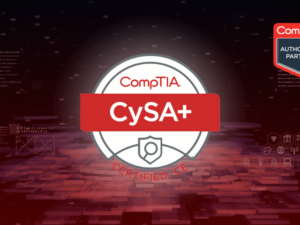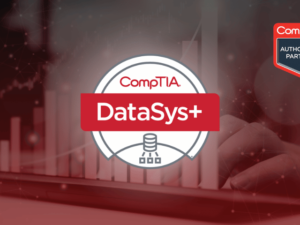Certified Ethical Hacker (CEH) v13
- Description
- Reviews

Course Overview
Introduction
The Certified Ethical Hacker (CEH) course equips IT professionals with the skills to identify vulnerabilities in systems and networks. It’s crucial for corporate IT teams aiming to protect their business from cyber threats.
Business Relevance
This training enhances your organization’s IT security posture, ensuring your systems are secure from external and internal threats. It helps streamline security processes, improving overall IT efficiency.
Target Area
Cybersecurity, focusing on proactive protection strategies and ethical hacking techniques.
What You’ll Learn & Who Should Enroll
Key Topics Covered:
- Ethical Hacking: Understanding how ethical hacking methods are used to assess system vulnerabilities and prevent attacks.
- Footprinting and Reconnaissance: Techniques for gathering critical information to enhance system security.
- System Hacking: Learning methods to exploit and secure systems.
- Cryptography: Applying encryption techniques to safeguard sensitive data.
- Malware Threats: Understanding malware and its impact on systems, along with ways to defend against attacks.
Ideal Participants:
This course is designed for:
- Cybersecurity Professionals – Individuals responsible for assessing and enhancing organizational security.
- Penetration Testers – Experts focused on identifying vulnerabilities through simulated attacks.
- IT Managers & Security Architects – Professionals overseeing the design and implementation of secure network infrastructures.
- Compliance Officers – Individuals ensuring organizations meet cybersecurity standards and regulations.
Business Applications & Next Steps
Key Business Impact:
- Enhanced Security & Compliance: Safeguard organizational assets by identifying and mitigating security vulnerabilities.
- Improved IT Governance: Establish strong governance frameworks and policies to mitigate cyber risks.
- Operational Efficiency: Reduce downtime and streamline security processes for better resource utilization.
Next-Level Training:
To further build expertise, consider:
- Certified Secure Computer User (CSCU): A focus on securing personal and organizational devices.
- Certified Penetration Testing Professional (CPENT): An in-depth look at penetration testing methodologies and advanced security techniques.
Why Choose Acumen IT Training?
- Enterprise-Focused Curriculum: Tailored for the unique challenges of corporate IT environments.
- Qualified-Led Training: Learn from professionals with years of industry experience.
- Business-Driven Learning: Gain skills that directly improve organizational performance.
- Flexible Training Options: Choose from Online, Hybrid Training, Instructor-Led On-Site (at your location or ours), and Corporate Group Sessions.
For the full course outline, schedules, and private corporate training inquiries, contact us at Acumen IT Training.
Course Outline
TRAINING INCLUSIONS
-
Comprehensive training materials and reference guides.
-
Hands-on lab exercises with real-world cybersecurity scenarios.
-
Certified Ethical Hacker Certificate of Training Completion.
-
Access to cybersecurity tools and simulated hacking environments.
-
30 Days Post-Training Support.
COURSE OUTLINE
MODULE 1 : Introduction to Ethical Hacking
MODULE 2 : Foot Printing and Reconnaissance
MODULE 3 : Scanning Networks
MODULE 4 : Enumeration
MODULE 5 : Vulnerability Analysis
MODULE 6 : System Hacking
MODULE 7 : Malware Threats
MODULE 8 : Sniffing
MODULE 9 : Social Engineering
MODULE 10 : Denial-of-Service
MODULE 11 : Session Hijacking
MODULE 12 : Evading IDS, Firewalls, and Honeypots
MODULE 13 : Hacking Web Servers
MODULE 14 : Hacking Web Applications
MODULE 15 : SQL Injection
MODULE 16 : Hacking Wireless Networks
MODULE 17 : Hacking Mobile Platforms
MODULE 18 : IoT Hacking
MODULE 19 : Cloud Computing
MODULE 20 : Cryptography
For FULL COURSE OUTLINE, please contact us.
Inquire now for schedules and private class bookings.
FAQs
- What is the Certified Ethical Hacker (CEH) training about?
This training provides in-depth knowledge of ethical hacking techniques, penetration testing, network security, and cybersecurity tools to assess and protect IT systems. - Who should attend this training?
IT professionals, security analysts, system administrators, penetration testers, and individuals interested in cybersecurity careers. - Do I need prior experience in cybersecurity?
Basic knowledge of networking, operating systems, and IT security is recommended but not required. - What skills will I gain from this training?
You will learn vulnerability assessment, penetration testing, malware analysis, social engineering, and security risk management. - How long is the training program?
The course is a five-day intensive training, including lectures, hands-on labs, and real-world hacking simulations. - Is the training available online?
Yes, we offer both online and in-person training options. - Why is ethical hacking important?
Ethical hacking helps organizations identify security weaknesses before malicious hackers can exploit them, reducing the risk of cyberattacks. - What tools and techniques will be covered?
You will work with Kali Linux, Metasploit, Nmap, Wireshark, Burp Suite, and more. - Will I receive a certificate after completing the course?
Yes, you will receive a Certified Ethical Hacker Certificate of Training Completion. - How can I enroll in this course?
You can contact us for schedules, private class bookings, and enrollment details.
Real-World Applications of Certified Ethical Hacker Training
Case Study 1: Strengthening a Financial Institution’s Security
Challenge: A bank wanted to test its cybersecurity defenses after an increase in phishing attempts.
Solution: Ethical hackers conducted penetration testing using simulated cyberattacks.
Result:
✅ Identified and patched vulnerabilities in banking systems
✅ Strengthened employee awareness of phishing attacks
✅ Reduced security risks by 75%
Case Study 2: Preventing Data Breaches for an E-Commerce Platform
Challenge: An online store experienced a data breach that exposed customer information.
Solution: Ethical hackers analyzed security loopholes and implemented stronger encryption and authentication measures.
Result:
✅ Enhanced security protocols, preventing future breaches
✅ Improved customer trust and data protection
✅ Complied with global security regulations
Use Case 1: Network Security for Enterprises
Ethical hackers help organizations protect their networks from cyber threats.
✅ Identifies system vulnerabilities before attackers do
✅ Improves security posture with proactive penetration testing
✅ Reduces the risk of financial and reputational damage
Use Case 2: Securing IoT Devices in Smart Homes
With the rise of smart devices, ethical hackers ensure that connected devices are secure.
✅ Tests security gaps in IoT devices to prevent hacking
✅ Strengthens encryption and access control
✅ Protects user data from cyber threats
Why These Case Studies Matter for You
These real-world applications demonstrate how ethical hacking safeguards businesses, prevents cyberattacks, and ensures data security.
🔗 Enroll today and become an expert in ethical hacking!
Testimonials: What Professionals Say About Our Certified Ethical Hacker Training
⭐ ⭐ ⭐ ⭐ ⭐ “A Must-Have for Cybersecurity Professionals!”
“This training gave me hands-on experience in ethical hacking and penetration testing. I feel confident applying these skills in my job.”
— John R., Security Analyst
⭐ ⭐ ⭐ ⭐ ⭐ “Extremely Practical and Well-Structured!”
“The course covered real-world hacking techniques, making it easy to understand how attackers think and how to defend against them.”
— Mike L., IT Administrator
⭐ ⭐ ⭐ ⭐ ⭐ “Highly Recommended for Cybersecurity Enthusiasts!”
“The hands-on labs were invaluable. I learned how to use various cybersecurity tools effectively.”
— Patricia S., Penetration Tester
Request a Quote
Popular Courses
Archive
Working hours
| Monday | 9:00 am - 6.00 pm |
| Tuesday | 9:00 am - 6.00 pm |
| Wednesday | 9:00 am - 6.00 pm |
| Thursday | 9:00 am - 6.00 pm |
| Friday | 9:00 am - 6.00 pm |
| Saturday | Closed |
| Sunday | Closed |











